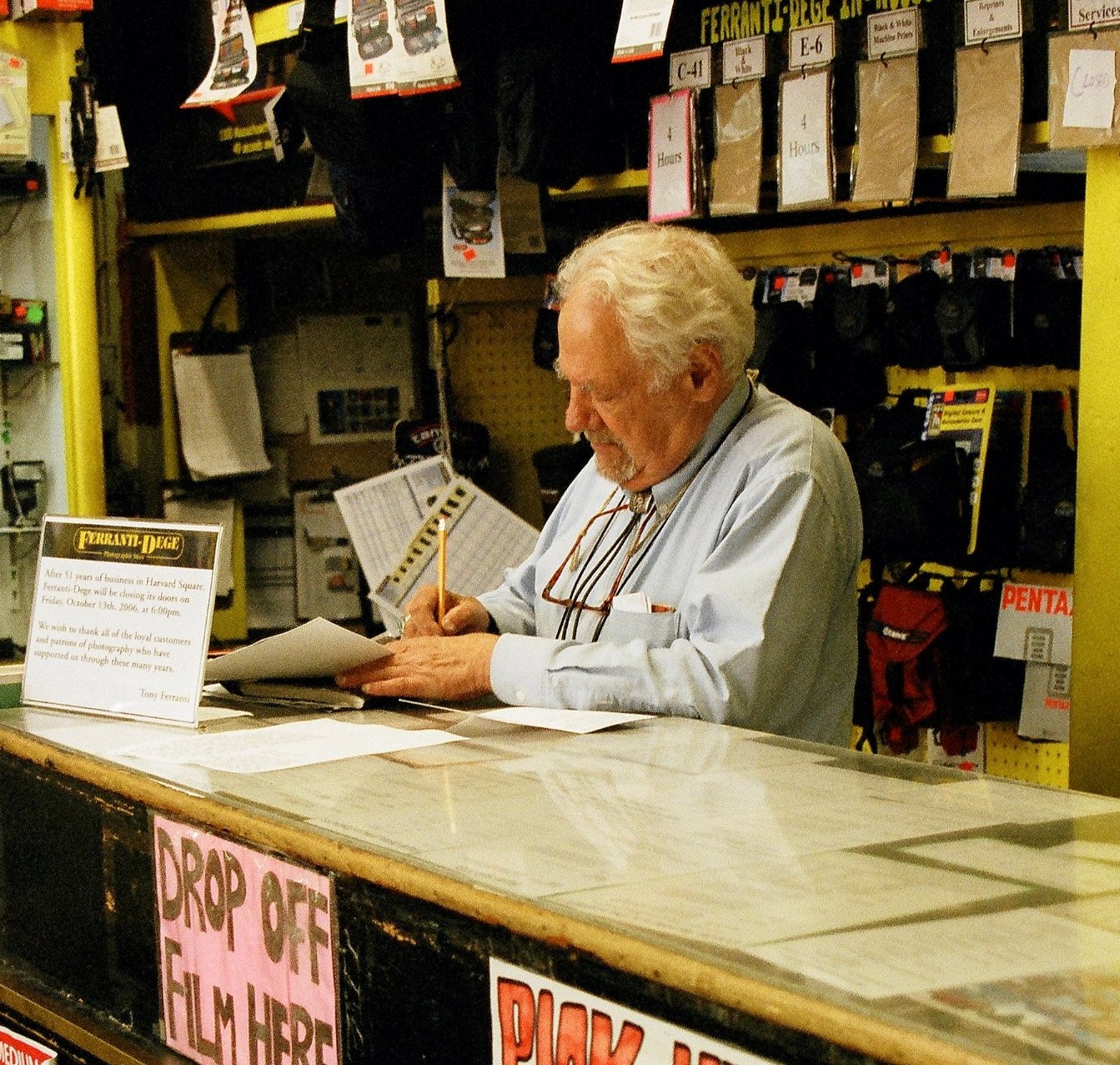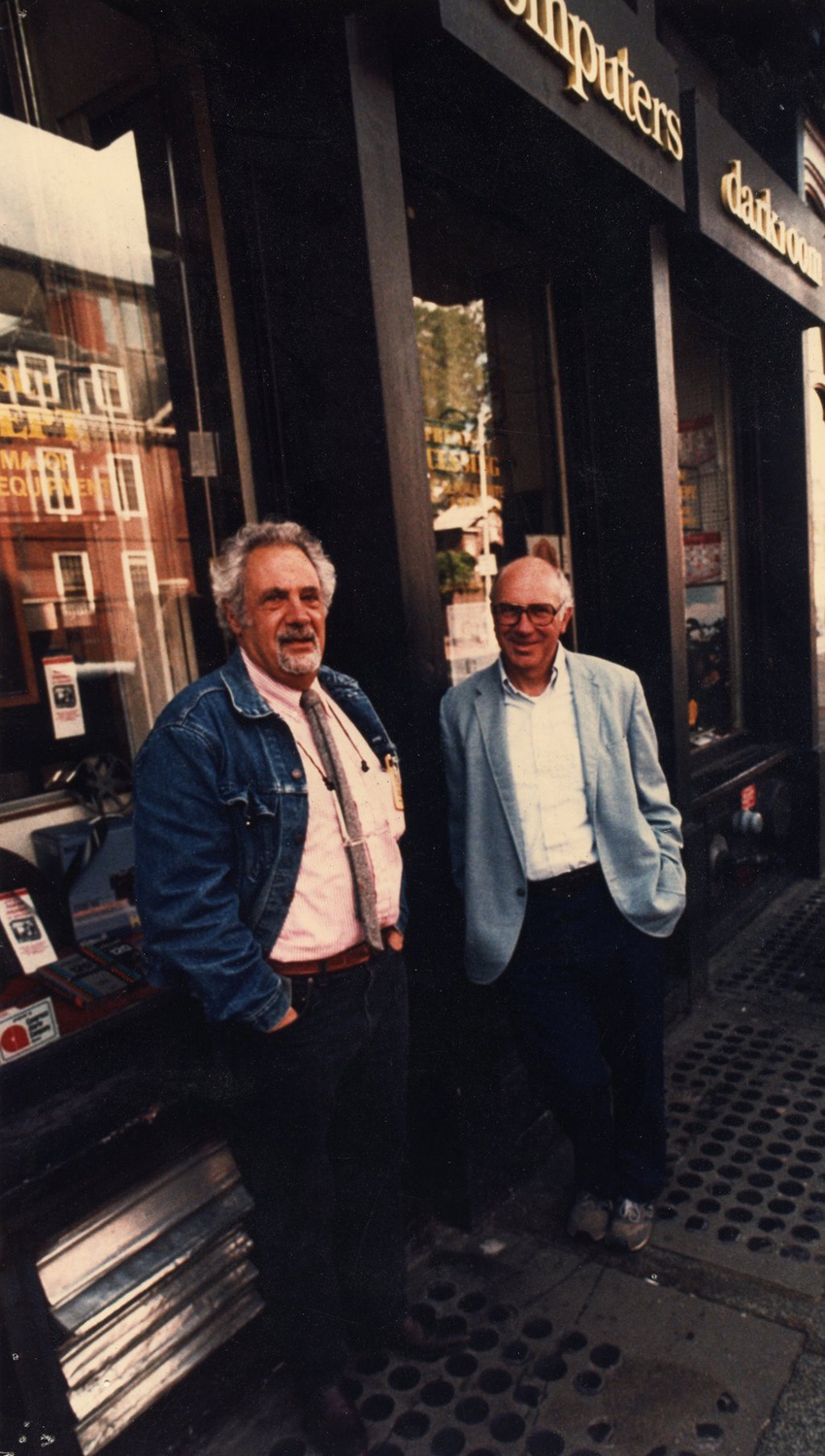
News
Summers Will Not Finish Semester of Teaching as Harvard Investigates Epstein Ties

News
Harvard College Students Report Favoring Divestment from Israel in HUA Survey

News
‘He Should Resign’: Harvard Undergrads Take Hard Line Against Summers Over Epstein Scandal

News
Harvard To Launch New Investigation Into Epstein’s Ties to Summers, Other University Affiliates

News
Harvard Students To Vote on Divestment From Israel in Inaugural HUA Election Survey
Anthony Ferranti ’46, Longtime Harvard Square Business Owner, Remembered as a Caring Mentor

Former employees of the Ferranti-Dege camera shop, co-founded by Anthony C. Ferranti ’46 in 1955, would affectionately refer to themselves as alumni of “Ferranti-Dege University.”
For many, the experience of working and shopping at the store often transcended the curriculum at the university across the street.
For 51 years, Ferranti watched Harvard students and Cambridge residents learn the craft of photography at his shop, which he ran with his brother until 2006, leaving an impression on many who passed through.
Ferranti died in July at his home in Scottsdale, Arizona, where he retired with his wife, Nancy Ferranti. He was 97.
Ferranti founded the shop with Al Dege and ran it for years alongside his brother, Charles F. Ferranti, who died in 2011. The camera store grew out of the now-defunct Harvard Barber Shop, co-owned by the Ferrantis’ father, Charles Ferranti, who immigrated to the United States from Italy.
The shop — which once resided in the space now occupied by Zinnia Jewelry — closed its doors in 2006, leaving longtime patrons to mourn its exit and celebrate the fond memories it created in the previous five decades.
“He made very good friends at Harvard that he kept throughout his life,” said Nancy Ferranti, his wife of 36 years. “He was part of Harvard Square, as a student and as a businessman.”
A former employee, Thomas N. Bethell ’62, wrote in a note to Ferranti that his work at the shop was the most meaningful aspect of his time at Harvard.
“I can’t count the number of times when someone has asked me where I went to college, and I say Ferranti-Dege,” Bethell wrote in the letter, provided by Nancy Ferranti.
“Getting to know you and Charlie and hanging out at F&D was far more important to me, and is much more fun to remember, than just about any of the classes I took — visited would be a better word — at Harvard,” he wrote.
The camera shop grew out of Ferranti’s experience as an undergraduate at Harvard.
James J. Casey, the store’s longtime manager, recalled that Ferranti would print slides from Harvard football games and project them in the store’s window all through Saturday night and Sunday morning.
“He hired a lot of college students, especially from Harvard, who needed the money to work because they were there on scholarship,” Casey said. “Tony and Charlie were brought up that you share what you have.”

Ferranti grew up working at the Harvard Barber Shop, his family’s business. He left Harvard after his freshman year to join the U.S. Air Force, stationed as a navigator in Washington state during World War II. After completing his service, Ferranti returned to complete his undergraduate degree, graduating in 1946.
Ferranti began his post-graduate life in politics, working for Adlai E. Stevenson II, the Democratic governor of Illinois who ran for president in 1952 and 1956.
In 1955, Ferranti and his brother opened Ferranti-Dege. While building his Harvard Square business, Ferranti continued his political advocacy, participating in civil rights and anti-Vietnam War protests, including the March on Washington in 1963.
Casey recalled one instance in which world-famous musicians John Lennon and Yoko Ono visited Ferranti-Dege, seeking a replacement part for one of Lennon’s video cameras. While customers and passers-by were captivated by the celebrities, Ferranti focused on making the sale.
“Tony really couldn’t care less about it. They’re just musicians,” Casey said. “It was a Saturday. It was a busy day, so let’s let everybody else just jump into things like that.”
After withstanding more than 50 years of change in Harvard Square, Ferranti was forced to close the store in 2006 due in part to waning interest in film photography.
“I will miss it,” Ferranti told The Crimson at the time.
Daniel Ferranti, Anthony Ferranti’s son, said his father was touched when a contingent of Cambridge residents came into the shop to give it a proper send-off on the day it closed.
“Right around closing time, they showed up with champagne and a chorus, and they sang to my dad,” Daniel Ferranti said. “He was simultaneously super touched and super taken aback, but I don’t think I’ve ever seen him both that happy and that vulnerable.”
Anthony Ferranti is survived by his wife, four sons, three step-children, and 12 grandchildren.
Corrections: October 18, 2022:
A previous version of this article incorrectly stated Anthony C. Ferranti ’46 co-founded the Ferranti-Dege camera shop with his brother. In fact, he founded the store with Al Dege and subsequently ran it for years alongside his brother.
A photo caption on a previous version of this article misstated the year Anthony C. Ferranti ’46 co-founded the Ferranti-Dege camera shop. He opened the shop in 1955.
— Staff writer Brandon L. Kingdollar can be reached at brandon.kingdollar@thecrimson.com. Follow him on Twitter at @newskingdollar.
Want to keep up with breaking news? Subscribe to our email newsletter.
